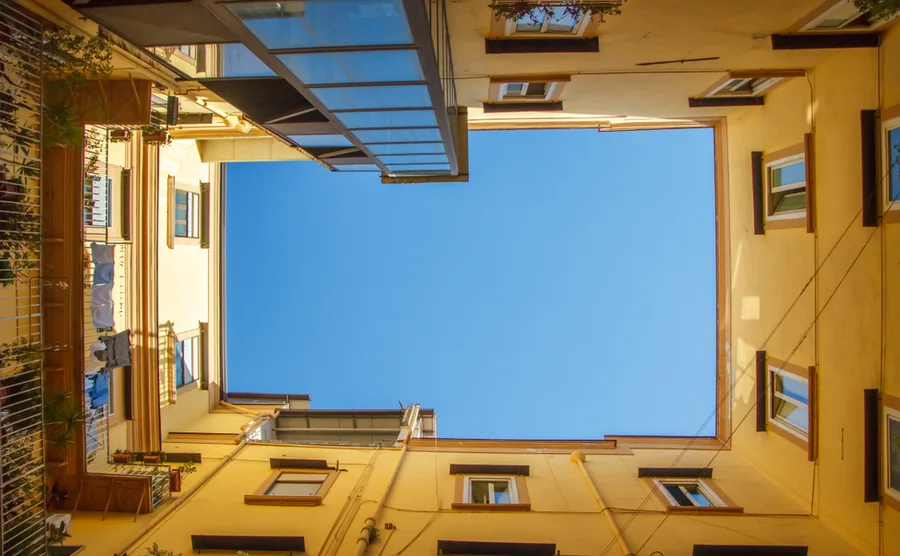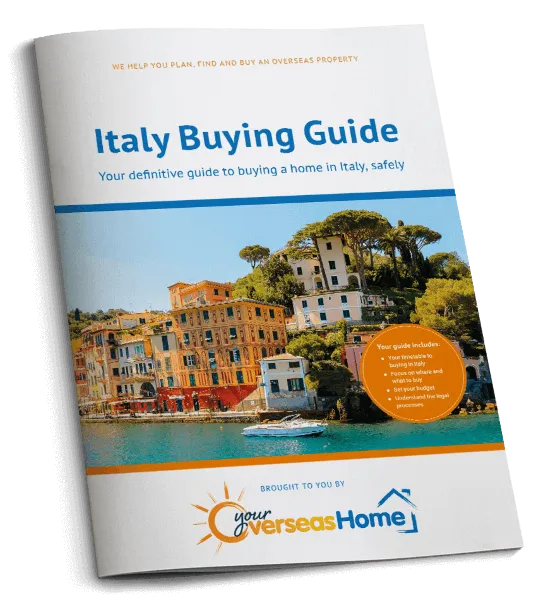If you find the legal processes of buying a property in Italy a little daunting, you’re not alone. Some would-be buyers are put off by the unfamiliarity of the legal process and the names of professional services they’re not used to, such as geometra and notary. In fact, they’re thinking about it the wrong way. The four main professionals in the Italian property buying process are there to help you. Let us introduce you to the licensed estate agent, lawyer, geometra and notary…
An incredible 600 people answered our 2022 reader survey, making it the most comprehensive pieces of research into the hopes, plans and concerns of international property buyers in Italy that we’ve ever seen.
One answer that leapt out at me was that 41% believe that “the legal process of buying [in Italy] is confusing and worrying.”
There is really no reason why this should be so. Of course, as someone who has done it, maybe I would say that. But when you have the best professionals looking out for your interests and guiding you through the buying process, there is no reason why your property purchase in Italy shouldn’t go smoothly. The estate agent, lawyer, geometra and notary all play their part in doing checks on the property, and if the paperwork is all in order it can take around six weeks for the purchase to go through.
By getting thorough checks done on the property right at the start, any issues should be identified early. You can then either walk away or if you are really keen on the property you can wait for the professionals to rectify the problem. This could take weeks or months depending what the issue is. The very best estate agents are those that do checks themselves before agreeing to put a house on the market.
Potential problems
Many foreign buyers love old houses full of Italian character. Often, such properties have never been through a sales process before, because previously they had been inherited. There may be multiple owners that need to all agree, or they may have added bits on over the years without applying for permission. Italian geometras and property lawyers come across these situations all the time, and are used to the procedures for putting them right.
A little knowledge now, will save confusion later
Whichever country you buy property in there are always going to be various checks on the property that need to be done before you can make the purchase. In the UK we just leave it all to the solicitor and surveyor and don’t think too much about what they are checking. In Italy, the job titles of the people able to do the various checks are different, so it’s worth familiarising yourself with what each one does before starting your property search. There are four key people you may need the services of during the buying process. Here we will look the role each one plays in making sure you property purchase goes smoothly.
Find homes in Italy via our property portal.
Estate agent
In Italy a good estate agent (agente immobiliare) will guide you through every stage of the purchase, from the viewing right through to signing the deeds. They often go above and beyond to ensure not only the purchase process goes without a hitch but also ensure you settle into your new home. They might give advice and make introductions to help you, get your tax code, open a bank account, get a mortgage, arrange bill payments, employ tradespeople and organise your move.
Must the estate agent be registered?
By law, real estate agents in Italy are required to be registered with the local chamber of commerce and hold a special identification card called the “Patentino di agente di affari in mediazione”, which you can ask to see. To get the licence they have to pass a course held by the local chamber of commerce, which covers every aspect of the job from law to building techniques.
Estate agent checks
While the estate agent isn’t obliged to undertake any technical or legal investigations which might have an impact on the transaction (legal due diligence), they must disclose information that they are aware of. It’s advisable to always ask if the paperwork is clean. By law they must not give incorrect or non-verified information to an interested party, and must disclose anything that may affect the sale. Therefore, it is in the interest of the agent to carry out checks on the property before they put it on the market.
The estate agent is able to check the Land Registry titles and plans, that the property complies with all the local planning and building regulations, and any relevant building plans approved by the local authority. The estate agent can also make sure that the owner holds the relevant certification of habitability (Certificato di Abitabilità) which is mandatory when selling a property.
Association of Estate Agents
If the agent is a member of an association of estate agencies in Italy, like the FIAIP (The Italian Federation of Agents) you know they are legal and have a code of practice. Their licence number and federation membership logo should be displayed on their website (usually at the bottom of the page near their address). Every agent must also have an indemnity insurance of Civil Liability in case of damage or an accident during viewings. Unlike many other countries, where the agent’s fee is paid exclusively by the seller, in Italy the real estate agency fee (usually 3%) is paid both by the seller and by the buyer.

The Neopolitan sky from a courtyard
Lawyer
As the estate agent represents both the buyer and the seller, you may decide to also use the services of a property lawyer (Avvocato). The Lawyer will represent your sole interests and can do thorough checks on the property and its seller. They can also check everything you sign from the pre-contract agreement to the final deeds.
Although, it’s not compulsory to use a lawyer, and many people in Italy don’t, as a foreign buyer it can be reassuring to do so. A lawyer is particularly useful if you can’t find a Notary that speaks English or if you want someone solely working for you to do the checks at an early stage. We would recommend using a lawyer that has a lot of experience dealing with foreign buyers, speaks your language and explains the buying process.
Generally, the documentation to be reviewed by the lawyer include:
- Property Deed (Titolo di Proprietà e/o di Provenienza) which confirms the ownership of the property and includes anything that may negatively affect the property.
- Certificate of building permit (Certificato di Destinazione Urbanistica), which provides information regarding the use of the plot of land according to the General Urban Development Plan (Piano Regolatore Urbanistico).
- Permit for sub-division of plots (Autorizzazione alla Lottizzazione)
- Town-Planning Conformity Law (Liceità Urbanistica)
- Retrospective planning permission (Concessione in Sanatoria), which regularizes any renovation or building work carried out on a property that hasn’t acquired the required permits.
- Certificate of use and occupancy (Certificato di Agibilità), which is issued by the local municipality and certifies a building’s compliance with health and safety and energy efficiency regulations.
- Rights of First Refusal (Diritti di Prelazione) properties of artistic and historic value are subject to the Italian Ministry of Cultural Heritage and Cultural Activities’ right of first refusal.
- Cadastral Documents (Documentazione Catastale). Using the cadastral registries they can research the properties current and previous owners as well as its compliance to cadastral laws and regulations. It is also highly advisable to obtain the property cadastral map (Mappa Catastale) and compare it with the actual structure of the property to ensure there are no discrepancies.
- Environmental Certification ensures the building is compliant with Italian environmental laws and regulations issued for public safety.
Geometra
A geometra is a property surveyor who can also do basic architect work. If you want a new house built or major architectural work done, then you would employ an architect. But if you just want a small extension a geometra is able to do the plans, put in the application for planning permission, and oversee the work. Their services are particularly useful when buying countryside properties needing renovation.

A geometra checks for damp
Getting a survey
Although by law, you are not required to have a survey, it’s probably best to get a survey done by a geometra before making an offer. His or her findings may affect how much you offer and if there are major problems you can walk away. As well as looking at the structure of the building and the utilities, they can give their opinion on the value of the property and determine what work needs to be done. The geometra may also be able to get you a quote for the cost of the work and the application for permissions.
What a geometra can check
A geometra can do a technical study of the building and determine whether it complies with the building codes in effect at the time the building was built. He or she can also verify the accuracy of the data, including the floor plan on file with the Real Estate Registry and the land registration, for tax purposes. When appointing a geometra to do a survey, make sure you are both clear exactly what he will include in it. In some cases they are happy to do a casual look around and verbally give their opinion for free in the hope you will give them work down the line. So make it clear if you want a more detailed investigation.
The perfect geometra comes recommended and is well tied into the community
If needed, a geometra can also assist in dividing a home up into separate units (frazionare) or in combining existing apartments into one home. They are also able to survey land, verify borders and combine or divide lots. It is sometimes the case that there have been illegal extensions, a staircase to the roof here, a garage there. The geometra will sort this out by either getting the seller to return everything to its original state as described in the “cadastre” or get it legalized. The perfect geometra comes recommended and is well tied into the community. Through local experience, they will know what the local town planning office will and won’t approve.
Notary
Any contract transferring the ownership of a property must to be signed in front of a Notary Public (Notaio Pubblico) as well as countersigned by the Notary in order to be legally binding. Italian public notaries are public officers appointed by the Italian Ministry of Justice. It is important to remember that they are fulfilling an official role and do not work on behalf of the buyer or the seller, but serve as a neutral party. Italian public notaries officially witness the wishes expressed by the signatories and give a personal guarantee regarding the content.

The notary does his work
Who chooses the Notary?
As it is the buyer that pays the notary fee, it is you that has the right to choose which Notary you use. Foreign buyers often seek help from a Notary who has been recommended to them by their estate agent, if they have experience of dealing with foreign buyers. In any case, the Notary should be based in the same area as the property you are purchasing. Find out more about notaries in Italy here.
Checking ID
The Notary will need to verify the identities of all parties. You will need ID, such as a passport, and an Italian Tax Code (Codice Fiscale). Your agent should be able to direct you to the local Italian Revenue Agency office (Agenzia delle Entrate). You simply fill out a form and you’ll be given a paper that has your official code for reference while you wait for your official card to be mailed to you.
Checks and payments
According to Italian Law, the Notary Public is also responsible for calculating the fees that are applicable to the transaction, collecting them from those parties on the final signing of the contract and paying them on their behalf.
Most importantly, the Notary is responsible for receiving all legal documents pertaining to the sale, verifying their authenticity and drawing up the deed of sale (Atto di Vendita). Among other things they will check that each party has the right to buy or sell the property and that no third parties have a claim on it. A notary may also search for any mortgages on the property or verify the presence of planning permission. However, they don’t visit the property to see that it is the same as the registered plan.
Signing day at the Notary Office
On the day the deeds are signed the buyer and seller go to the Notary’s office, along with any other parties assisting with the transaction, such as the estate agent, lawyer and translator. The terms of the contract are read out in Italian and English in order for it to be clear to all parties involved. Once read, the three copies of the contract must be signed by everyone in front of the notary, and then signed by the notary. The whole procedure can take quite a while, but it is reassuring to read everything carefully and understand it before signing. Feel free to ask for clarification on any points you don’t understand.
After the Purchase Contract has been signed, the Notary Public files the property title with the local County Register of Deeds (Conservatoria dei Registri Immobiliari) making the transaction official. The Notary Public will keep the original copies for official records and copies will be made available for all parties involved, you will also receive an English copy. Immediately after signing the deed the final payment and the handover of the keys takes place. If you are buying an old property you could be handed a wonderful big old key, that has been used for centuries.
Paying through the Notary
The safest way to transfer the money for your house purchase is using a currency exchange company, such as Smart Currency Exchange, and transferring the money into the Notary’s escrow account. Then it will all be there ready for the big day.
A Notary escrow account is a bonded client account (registered by Italian Law 124/2017) in which the notary can receive funds for the payment of property and hold it safely in that account until it’s time to make the payment to the seller. In Italy only a Notary escrow account benefits from full and complete protection against possible creditors on funds held in it. Alternatively, you may wish to open an Italian bank account and pay using a guaranteed bank draft.
Buyer confidence is increasing
Such is the confidence in buying property in Italy, that despite the pandemic real estate sales in 2021 rose by 35% compared to 2020. According to the Statistical Notary Data Report there was a total of 1,058,732 transactions in 2021, compared to 786,599 in 2020 and 853,247 in 2019.
In Italy, over 70% of people own their homes and many have inherited second homes. While some people keep these second homes for sentimental reasons, more are now coming onto the market. The best new buys will sell fast, leaving websites showing mainly properties that have been there for years because the owners are being unrealistic on their asking price. The best approach is always to arrange a viewing trip and see what’s available when you come.










